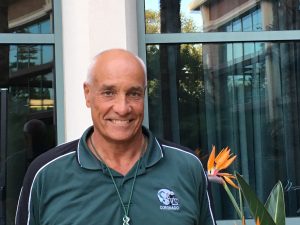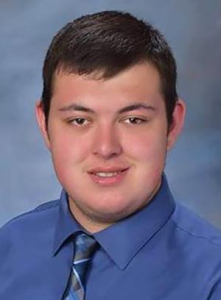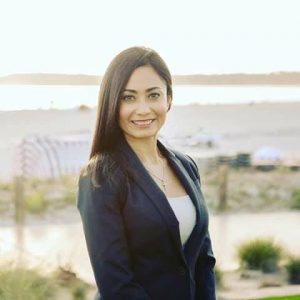Three seats on the Coronado Unified School District’s Governing Board are up for a vote this November. There are four candidates in the running: incumbents Lee Pontes and Esther Valdes, and newcomers Helen Anderson-Cruz and Kyle Tupas.
Once elections are over, the five-member Board will face such issues as the pending negotiation around teachers’ salaries, which has taken on an increasingly contentious tone, limited resources based on the state’s Local Control Funding Formula (LCFF), decreasing enrollment, and safety concerns amid a troubling uptick in gun violence at schools, with California leading the nation in gun-related deaths from school shootings.

When interviewed individually, each candidate seemed undaunted by the challenges ahead and eager to lead on behalf of the local community. As “a public school system, it needs to be managed by the public for the public,” Lee Pontes stated. “Our biggest responsibility is providing [the Superintendent] the direction to run the district in the way that we believe that people that voted for us want the district to be run.”

Kyle Tupas, a 2018 graduate of Coronado High School, proclaimed that this is a “good school district. I loved it there. But there could be some improvements.” Dr. Helen Anderson-Cruz highlighted that “everyone in the community has the same goal: to do the best for our children. I believe the responsibility of school board trustees is to set the vision and goals for the district, adopt policies that give the district direction and achieve its goals, hire and evaluate the superintendent, adopt and oversee the annual budget, and manage the collective bargaining process for employees of the district.” Esther Valdes praised her fellow Board members, saying that “we are all well-informed and bring up questions and challenges…serving on the Board has been a privilege and an honor.”
The overarching questions for the board, according to Pontes, are: “Do we want to spend a lot of money on teachers? Do we want to spend a lot of money on programs? How much money are we going to spend on our facilities?” Here is where the LCFF factors in, as its redistribution of local funds provides significantly less funding than other districts despite Coronado’s high property tax rate. As a result, notes Pontes, “we have to be conservative in how we’re spending our funds.” This is a common refrain from the candidates, all of whom identified as fiscal conservatives.
On teachers’ salaries, Tupas emphasized that “we don’t want to lay off teachers.” When asked how he would navigate the complex and strained negotiations, he stated that he “would listen to both sides, see what the union wants and reach a compromise.” Pontes said that “any time we decide to give out teacher raises, that money’s got to come from somewhere, so hopefully we can come to some agreement with them.” It’s either taking money from somewhere else, “or going into deficit.” There are a variety of viewpoints on how and how much to fund teachers, with some employing a market-rate approach and others starting from a position that teachers should be paid much higher wages on principle.

Anderson-Cruz “would like to pay Coronado teachers the most that we can pay them within budgetary constraints.” She considers herself “a bridge-builder” when asked about what the community can expect from her in ongoing negotiations. “I’m also very persuasive” in a non-aggressive manner, preferring to interact in a “low-key” way. “I’m not shy about asking for a response. But I can’t demand… We need to keep talking. I believe that – it is possible. My background is a consensus-builder. I’m an optimist. Compromise is required. I’d like to see acrimony dissipate.” She is a life-long educator who has taught both children and adult learners from different countries.

Esther Valdes, an attorney who has been in private practice for over 13 years, according to her campaign website, believes in working towards “salary parity for teachers.” As a member of a family of educators, a daughter of Mexican immigrants, and a “product of an excellent public school education,” Valdes wants others to have access to the same types of opportunities that allowed her and her daughter to thrive; her daughter attended Coronado High School, and Valdes always felt secure in the fact that her daughter was in the care of top instructors during the day who turned out a “well-rounded student who was in a safe environment.” Valdes is proud to be a part of “an educated electorate” in Coronado and takes her responsibility as a fiduciary seriously. She is mindful that quality education “starts with quality educators,” acknowledging that, increasingly, “teachers are asked to do more with less.” Regarding negotiations, she is open to considering anything that could bring progress, stating that “nothing is off the table.”
In terms of the work with Superintendent Karl Mueller, Pontes affirmed that “the superintendent and his staff have done a really good job looking for efficiencies within the district to save money.” Pontes cited an example of the superintendent deciding to not rehire staff in the past as an efficient administrative cut, noting that the vast majority of the budget is in personnel. “He laid off a couple of people in the district office to look for places to save money without impacting the students too much…and not impact programs.” Anderson-Cruz lauded her positive relationship with the superintendent, and has known him since he was the principal of Coronado High School. She frequently attends board meetings and finds the superintendent “very accessible.”
Tupas believes that more can be done, however. His priority is the budget, an issue he stated has been deferred for too long. “If it comes down to it, I will make the tough, but necessary cuts in order to maintain our high quality of education,” Tupas wrote recently in an online post. Where those cuts will come from, Tupas does not know. If elected, he intends to “instruct the superintendent” to find them. Despite his young age and lack of experience in leadership positions in the past, he believes that he is ready to provide the type of leadership that the board needs. He attributes this readiness with an insider’s view into the local school experience. He pointed out that among the other candidates, he is the only one to have attended Coronado Middle School and Coronado High School. “I’m aware that my opponents have a lot of years of higher education and the working world. I’m the only one who went through Coronado schools.”
Anderson-Cruz reflected on her 20 years of experience teaching high school seniors. “I know they’re not children. They’re young adults. On the board, you should have work experience. The student perspective is from the desk. I believe it’s good to encourage people who are civic-minded, and if I don’t win, I’ll continue working with the Coronado Schools Foundation,” where she currently works. In addition to having worked as a teacher and professor, she also has a business background, having started and run her own company in the education field. As an active resident of the Coronado Cays, she has brought forth concerns from that area of the community to the board’s attention, citing the issue of a lack of bussing from the Cays to neighborhood schools as an example.
Pontes thinks that “it’s really important that we have some continuity on the Board…I remember when I did get appointed last time, I felt pretty well prepared, having taught in the district and attended school board meetings and knowing the issues. But really when I got on the job…I realized it was going to be harder than I thought. There’s a lot more intricacies than you see sitting out in the audience. I realized that there is a learning curve involved.”
Pontes, addressed as Captain, was a 25-year Naval Officer with three sons who graduated from Coronado High School. He launched the school’s Junior ROTC program towards the end of his military career in 2003 and worked there directly under Karl Mueller, who was the principal at the time, for seven years. Four years ago, a spot opened up on the CUSD Board and Pontes was asked to run. Facing no contenders, he was easily appointed.
This year is different for Pontes with three opponents, but his campaign is modest at best. Signs have popped up around town, and he’s availed himself of the press, but he is not planning on going door-to-door. “People have been following what the board has been doing for the past four years, so I’m kind of a known commodity in that regard. I’ve been in Coronado since 1996. I just look forward to continuing to serve.” On his leadership style, Pontes shares that, “I definitely rely on the managerial experience and the leadership experience I had in the Navy quite frequently.”
Anderson-Cruz, a long-time resident of Coronado, has been doing her campaigning “the old-fashioned way,” walking and talking with community members on the streets, speaking publicly when possible, and doing meet-and-greets. “I’m very accessible.” She is passionate when discussing any issue related to pedagogy, teacher training – she was a trainer in the past – and professional development, and school safety. She sees herself as a “common-sense advocate of problem-solving.” She also appreciates the broader community’s efforts at contributing to the resources and quality of local education: “We have great corporate donors.”
Making a point to neither seek nor accept donations in order to maintain his “independent voice,” Tupas is taking the free online route to campaigning. Tupas has already utilized social media to communicate with the voters. In a recent post on the Coronado Electorate Facebook group, he introduced himself, described his reasons for running, and outlined his platform. He also mentioned towards the end of the post that he has been endorsed by Mayor Richard Bailey and City Council Candidate Derik Mundt. Tupas believes that there is room for more transparency and accessibility, a need that he would like to have the chance to meet: “You could reach out to me on Facebook [or] email me and I’ll answer as fast as possible.” Valdes similarly believes in the need for greater communication, noting that “you learn something when you listen. Maybe there are more creative solutions.”
Anderson-Cruz prefers “face-to-face” interactions, as it “decreases messages getting misconstrued or people becoming keyboard warriors. It’s easy to be brave behind the keyboard. I believe people should be polite – it is possible to disagree without being disagreeable.” She is also concerned about reaching out to the many residents who are not online, pointing out that “not everyone has a computer in their house, and many are without social media.”
Of the current board’s dynamic, Valdes describes it as positively “challenging: everyone is smart, everyone has an element that they bring a specialty to. We don’t just go with the status quo.” She is proud of her work forming “what we loosely call a legal committee.” On the hundreds of pages of regulations, bylaws, amendments and various other documents that make their way to the board, she shared that the committee “committed to reading every line…sent to the school district for review [when] a lot of districts take the word of other lawyers or people who reviewed it. I do my legal research.” Anderson-Cruz also welcomes the opportunity to dive into the detailed text, noting that “as a dissertation and thesis adviser, I am used to reading copious amounts of pages.”
Pontes has high hopes and expectations of the board’s work. “We are a high-achieving district. We will continue to demand that we maintain our student achievement, if not improve that. That’s one of the things included in our strategic plan.” School safety is also an important issue that occupies him, and he currently serves on the safety committee that has been meeting since April of this year. He credits the committee’s approach of looking at the socio-emotional side of our students, what we can offer them, how to make sure that students are supporting each other, how are they connecting with their teachers and their community.” Increasing opportunities for counseling and the number of Campus Assistants who serve as another set of eyes on campus and become familiar with the students are cornerstones of protecting kids are all key areas that Pontes is supporting. He also values physical security measures, although he is careful to point out that “we don’t want to turn the school house into a jail house.”
Local public school boards – and their meetings – are the sites of “direct democracy in action.” Its legal framework pre-dates the founding of this country. In 1642 the Commonwealth of Massachusetts mandated that children receive a public education, thereby enshrining in law the principle that education is a public good. Five years later, it was ordered that every town with at least 100 households provide a trained teacher and a grammar school at taxpayer expense. For hundreds of years, towns throughout the country – via school boards – have grappled with and worked through how to transmit and build upon the core goals and values of their communities within their funding constraints. Coronado voters will have an opportunity to contribute to this conversation during this next election on November 6. Valdes hopes that they remember that “school is still the way to social mobility, an opportunity to become all you can be and help others.”





